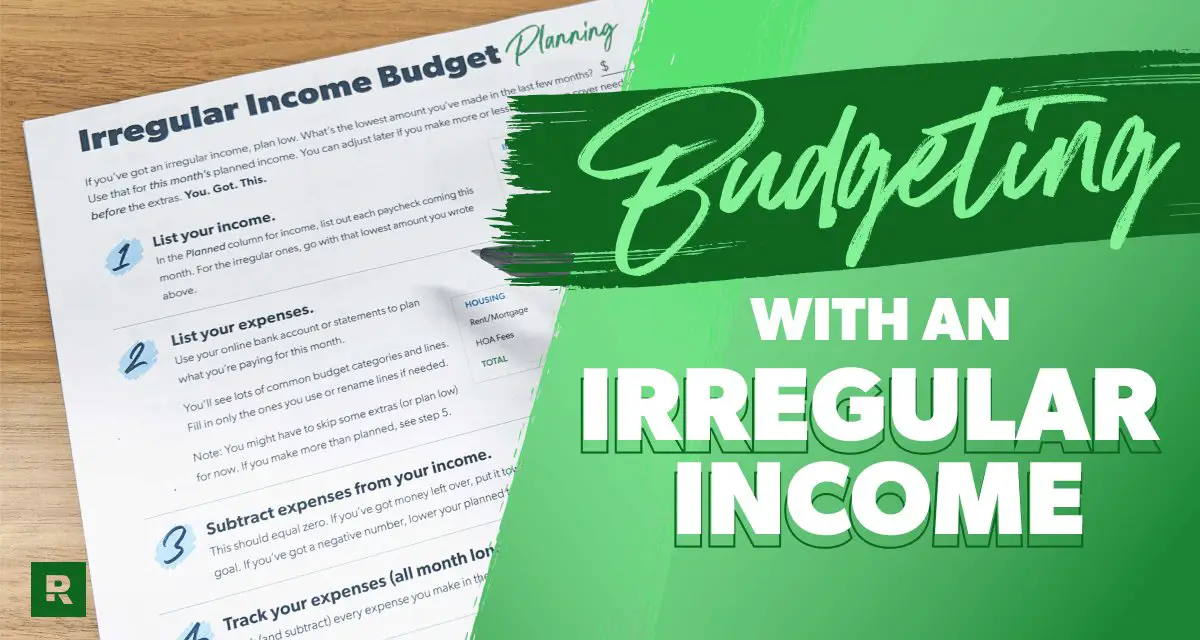Are you struggling with managing your finances on an irregular income? Don’t worry, I’ve got you covered. In this blog article, I’ll show you exactly how to make a budget for irregular income. It’s a common challenge for many people, but with the right approach, you can take control of your finances and achieve financial stability. So, let’s dive in and explore practical strategies that will help you effectively manage your income and expenses, even when your earnings fluctuate.
How to Make a Budget for Irregular Income
Managing your finances can be challenging, especially when your income is irregular. If you’re a freelancer, self-employed, or have a job with variable pay, having a budget is crucial to maintaining financial stability. A budget allows you to track your income, plan your expenses, and ensure you’re adequately prepared for any financial fluctuations. In this article, we’ll guide you through the process of creating a budget for irregular income, providing you with valuable tips and strategies to help you stay on top of your finances.
1. Assess Your Income Patterns
Before diving into budgeting, it’s essential to understand your income patterns. Irregular income can vary from month to month, making it crucial to analyze your earnings over an extended period. Consider the following steps to assess your income patterns:
1.1 Track Your Income
Start by reviewing your income from the past six to twelve months. Gather bank statements, invoices, payment receipts, and any other relevant documents to determine the average monthly income. Note down the highest and lowest earning months to get a sense of the income range.
1.2 Identify Trends
Look for any trends or patterns in your income. Do you experience seasonal fluctuations? Are there months where you consistently earn less? Understanding these patterns will help you anticipate lean months and make appropriate adjustments to your budget.
1.3 Account for Unpredictability
Acknowledge that irregular income can be unpredictable. Prepare yourself for unexpected decreases in income, as well as windfalls or bonuses. Consider setting aside a portion of your earnings as a buffer to cover any income gaps.
2. Determine Your Essential Expenses
To create a budget for irregular income, it’s vital to distinguish between essential and non-essential expenses. Essential expenses are the ones you must pay to maintain a basic standard of living. These typically include:
- Housing costs (rent or mortgage)
- Utilities (electricity, water, gas)
- Transportation (car payments, public transportation)
- Food and groceries
- Insurance (health, auto, home)
- Debt payments
- Minimum savings
2.1 Calculate Your Total Essential Expenses
Review your past expenses and calculate the total amount you spend on essential items each month. If you have trouble estimating, divide your annual costs by twelve to get a monthly average. This amount will serve as a baseline for your budget.
2.2 Allocate a Percentage of Your Income
Since your income is irregular, it’s best to allocate a percentage of each payment you receive towards your essential expenses. Determine what percentage is necessary to cover your essential costs, ensuring you account for both the higher and lower ends of your income range.
3. Prioritize Financial Goals
While covering essential expenses is crucial, it’s equally important to save for the future and work towards your financial goals. Consider the following steps to prioritize your financial objectives:
3.1 Emergency Fund
Building an emergency fund should be one of your top priorities. Aim to save at least three to six months’ worth of living expenses to provide a safety net during lean months or unforeseen circumstances. Set a specific amount to save each month and make it a non-negotiable part of your budget.
3.2 Debt Repayment
If you have any outstanding debts, prioritize paying them off. Consider using the debt snowball or debt avalanche method to tackle debt strategically. Allocate a portion of each payment towards debt repayment, ensuring it aligns with your income fluctuations.
3.3 Long-Term Savings Goals
Beyond your emergency fund and debt repayment, consider your long-term savings goals. Whether it’s saving for retirement, a down payment on a house, or your children’s education, determine how much you can comfortably set aside each month towards these goals.
4. Create Budget Categories
With your essential expenses and financial goals in mind, it’s time to create budget categories. These categories will help you allocate your income effectively and ensure you’re covering all necessary expenses. Consider the following categories:
4.1 Essential Expenses
Allocate a portion of each income payment towards your essential expenses category. Depending on your income fluctuations, you may need to adjust the percentage allocated to cover these costs adequately.
4.2 Savings and Investments
Create a category for savings and investments, which includes your emergency fund, debt repayment, and long-term savings goals. Allocate a specific percentage or dollar amount towards this category to ensure you’re consistently working towards your financial objectives.
4.3 Flexible Expenses
Flexible expenses include discretionary spending, entertainment, dining out, and non-essential purchases. While these expenses are not essential, it’s crucial to allocate some funds for personal enjoyment. However, be mindful of your income fluctuations and adjust this category accordingly.
5. Monitor and Adjust Regularly
Creating a budget is not a one-time task. It requires regular monitoring and adjustment to ensure it remains effective. Consider the following steps to monitor and adjust your budget:
5.1 Track Your Expenses
Keep a record of your expenses and compare them to your budgeted amounts. This will help you identify any discrepancies and areas where you may be overspending. Use budgeting apps or spreadsheets to simplify the tracking process.
5.2 Evaluate your Budget Regularly
Review your budget monthly or quarterly to analyze any changes in your income patterns or financial goals. Adjust your budget categories and percentages as needed to accommodate these changes and ensure your budget remains relevant.
5.3 Be Flexible and Adaptable
Remember that a budget for irregular income requires flexibility. Be prepared to make adjustments when necessary. During higher-income months, consider allocating more towards savings or debt repayment. In leaner months, focus on covering essential expenses and reducing discretionary spending.
Making a budget for irregular income may initially seem challenging, but it’s a crucial step towards financial stability. By assessing your income patterns, determining essential expenses, prioritizing financial goals, creating budget categories, and regularly monitoring and adjusting, you can effectively manage your finances despite irregular income. With a well-planned budget in place, you’ll be better equipped to handle financial fluctuations and achieve your long-term financial aspirations. Start today and take control of your financial future.
How Do We Budget On An Irregular Income?
Frequently Asked Questions
Frequently Asked Questions (FAQs)
How can I make a budget for irregular income?
Making a budget for irregular income can be challenging, but with a few strategies, it is possible to manage your finances effectively. Here are some steps you can take:
What is the first step in budgeting with irregular income?
The first step is to determine your average monthly income by calculating the total income you received in the past year and dividing it by twelve. This average will serve as the basis for your budget.
Should I prioritize saving or paying off debts with irregular income?
It is important to strike a balance between saving and paying off debts. Begin by setting aside some money for an emergency fund, and then focus on paying high-interest debts. Once you have a stable income, you can increase your savings and accelerate debt payments.
How can I create a budget when my income varies greatly each month?
One approach is to divide your expenses into fixed and variable categories. Allocate a portion of your income to cover fixed expenses like rent or mortgage, utilities, and loan payments. Then, budget for variable expenses like groceries, entertainment, and transportation based on your average income.
What strategies can I use to handle irregular expenses?
To handle irregular expenses, consider setting up sinking funds. Allocate a small amount from each paycheck to save for future expenses such as car repairs, medical bills, or vacations. This way, you won’t be caught off guard when these expenses arise.
Is it necessary to track my spending when budgeting with irregular income?
Yes, tracking your spending is crucial when budgeting with irregular income. It helps you understand your spending patterns, identify areas where you can cut back, and ensure that you stay within your budget limits.
How can I adjust my budget when my income fluctuates significantly?
When your income fluctuates significantly, you may need to adjust your budget accordingly. Review your income and expenses regularly, and make necessary adjustments to ensure your spending aligns with your income. Prioritize essential expenses and be flexible with non-essential ones.
What are some additional tips for budgeting with irregular income?
– Build an emergency fund to provide a safety net during low-income months.
– Consider taking on side gigs or freelance work to supplement your income.
– Plan for seasonal variations in income by saving during high-income months.
– Seek professional advice from financial advisors or budgeting experts for personalized strategies based on your specific situation.
Final Thoughts
Budgeting with irregular income can be challenging, but with a few simple strategies, you can effectively manage your finances. Start by calculating an average monthly income based on your past earnings. Prioritize your expenses, allocating funds for essential categories like housing, utilities, and debt payments. Create a separate savings account for irregular income, where you can deposit any extra money or windfalls. Consider setting aside a portion of your earnings for future expenses, emergencies, and taxes. Regularly review and adjust your budget as your income fluctuates, ensuring that you are prepared for any financial situation. By implementing these tips, you can successfully make a budget for irregular income and maintain control over your finances.



